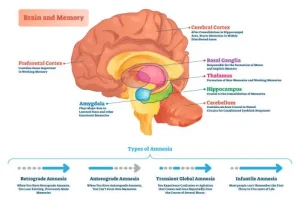Overview
Diagnosis of Amnesia
A comprehensive evaluation is essential to diagnose amnesia and rule out other causes of memory loss, such as Alzheimer’s disease, dementia, depression, or brain tumors.
Medical History
The evaluation begins with a detailed medical history. Because memory loss can limit the information a patient provides, a family member or caregiver may be asked to assist.
Healthcare professionals often explore:
-
Type of memory loss (recent vs. long-term)
-
Onset and progression of memory loss
-
Triggers such as head injury, stroke, or surgery
-
Family history of neurological conditions
-
Drug and alcohol use
-
Additional symptoms like confusion, language problems, personality changes, or difficulty with self-care
-
History of seizures, headaches, depression, or cancer
Physical Exam
The physical exam may include a neurological assessment to check:
-
Reflexes
-
Sensory function
-
Balance and coordination
Cognitive Tests
Cognitive testing evaluates thinking, memory, and judgment. Examples of assessment methods include:
-
Recalling personal and general information
-
Repeating lists of words or numbers
-
Assessing the ability to perform daily tasks
These tests help determine the severity of memory loss and guide treatment planning.
Diagnostic Tests
Additional tests may be recommended to identify the underlying cause of amnesia:
-
Imaging tests: MRI or CT scans detect brain damage or structural changes.
-
Blood tests: Identify infections, nutrient deficiencies, or metabolic problems.
-
Electroencephalogram (EEG): Detects seizure activity that could affect memory.
Treatment of Amnesia
Treatment focuses on strategies to manage memory loss and addressing any underlying conditions.
Occupational Therapy
-
Helps patients learn new information and compensate for lost memory.
-
Memory training may include strategies for organizing information and improving communication skills.
Technological Assistance
-
Smartphones, tablets, and electronic organizers can provide reminders for medications and daily tasks.
-
Other aids include notebooks, wall calendars, pill organizers, and photographs.
Medicines or Supplements
-
Most types of amnesia have no specific drug treatments.
-
If caused by Wernicke-Korsakoff syndrome, treatment includes thiamin replacement, proper nutrition, and avoiding alcohol.
-
If caused by Alzheimer’s disease, cholinesterase inhibitors may help manage symptoms.
Research and Future Treatments
-
Ongoing research aims to develop new treatments for memory loss.
-
Due to the complexity of brain processes, no single medication can fully restore memory.
Key Takeaways
-
Amnesia requires a comprehensive evaluation, including medical history, physical and cognitive exams, and diagnostic tests.
-
Treatment focuses on memory compensation, technological aids, and managing underlying conditions.
-
Some causes, like Wernicke-Korsakoff syndrome or Alzheimer’s, may benefit from specific medical interventions.
Advertisement

